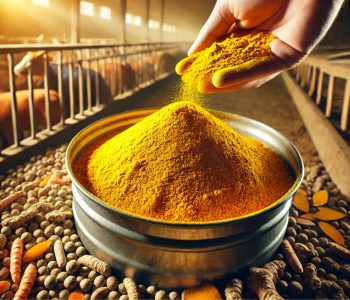The Role of Turmeric and Natural Feed Additives in Animal Production
Introduction
The use of natural feed additives in animal production has gained significant attention as an alternative to antimicrobial growth promoters (AGPs). With rising concerns about antimicrobial resistance (AMR) and regulatory bans on AGPs in various regions, researchers and producers have explored phytogenic feed additives such as turmeric (Curcuma longa) and other herbal extracts for their antioxidant, anti-inflammatory, and antimicrobial properties. These additives have shown potential in improving growth performance, meat quality, and overall health in livestock and poultry.
Turmeric as a Natural Feed Additive
Bioactive Properties of Curcumin
Turmeric contains curcumin, a bioactive compound recognized for its potent antioxidant, anti-inflammatory, and antimicrobial effects. In livestock and poultry nutrition, curcumin has been investigated for its role in enhancing immune response, improving feed efficiency, and promoting gut health. Studies have demonstrated its ability to reduce oxidative stress, which is a major factor affecting meat quality and production efficiency.
Impact on Poultry Production
In broiler production, turmeric has been studied as an alternative to synthetic antioxidants. Research indicates that dietary supplementation with 100 mg/kg of curcumin can:
- Reduce saturated fatty acid (SFA) content in meat, which is beneficial for human consumption.
- Increase polyunsaturated fatty acids (PUFAs), improving the nutritional profile of meat.
- Enhance oxidative stability, extending the shelf life of poultry products by reducing lipid peroxidation.
- Improve gut health, potentially reducing pathogenic bacterial loads and supporting intestinal integrity.
These effects have been linked to curcumin’s ability to modulate lipid metabolism, influence fatty acid biosynthesis, and upregulate antioxidant enzyme activity such as superoxide dismutase (SOD).
Other Phytogenic Feed Additives and Their Benefits
Essential Oils and Herbal Extracts
Several essential oils and herbal extracts, including cinnamon oil, thymol, and carvacrol, have been explored for their impact on animal nutrition. Studies show that:
- Thymol and carvacrol supplementation in poultry diets can reduce SFA content while increasing omega-6 PUFA levels.
- Cinnamon oil improves meat quality by promoting the accumulation of PUFAs and reducing saturated fats.
- Glycerol monolaurate (GML) has been linked to improved water-holding capacity of meat and reduced lipid content.
These findings suggest that phytogenic additives can significantly influence lipid metabolism, thereby enhancing the nutritional value of animal-derived food products.
Turmeric and Feed Additives in Swine and Ruminant Nutrition
Potential Applications in Swine
In swine production, curcumin and other herbal extracts have been studied for their ability to:
- Enhance gut health and microbiota balance, reducing reliance on antibiotics.
- Improve immune function, minimizing the impact of stress and disease challenges.
- Increase antioxidant status, helping to protect muscle tissue from oxidative damage.
Effects on Ruminant Health and Performance
In ruminants, the incorporation of natural feed additives such as turmeric, essential oils, and polyphenols has been explored for their effects on:
- Methane reduction, contributing to more sustainable livestock production.
- Enhancing nutrient absorption and rumen fermentation efficiency.
- Improving meat and milk quality by increasing the proportion of unsaturated fatty acids.
Challenges and Future Perspectives
Despite the promising benefits of turmeric and phytogenic feed additives, several challenges remain:
- Standardization and Bioavailability: The efficacy of curcumin and other natural compounds depends on their bioavailability and stability in animal feed. Encapsulation and nano-formulation techniques are being explored to enhance absorption.
- Regulatory Approval: While many phytogenic additives are recognized as safe (e.g., Generally Recognized as Safe – GRAS status for turmeric by the FDA), variations in regulatory frameworks across different regions may limit widespread adoption.
- Cost-effectiveness: The inclusion of herbal extracts and essential oils must be economically viable for farmers to integrate into large-scale production systems.
Conclusion
The use of turmeric and other natural feed additives represents a promising strategy for improving animal health, enhancing meat quality, and reducing reliance on antibiotics in production systems. Their ability to act as natural antioxidants, immune modulators, and gut health enhancers positions them as valuable tools in sustainable livestock farming. Future research should focus on optimizing dosage strategies, improving bioavailability, and assessing their long-term effects on animal performance and food quality.
As consumer demand for natural and antibiotic-free animal products continues to rise, the integration of phytogenics, herbal extracts, and functional feed additives is likely to play an increasing role in modern animal nutrition.
